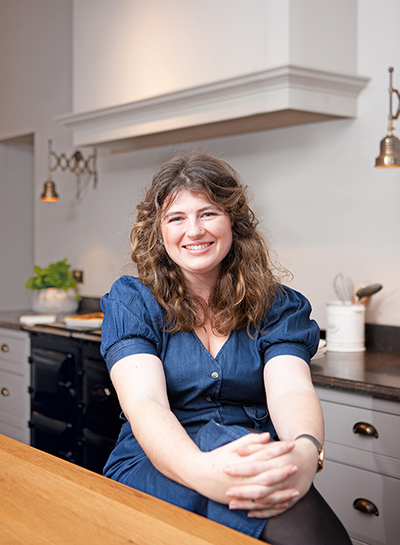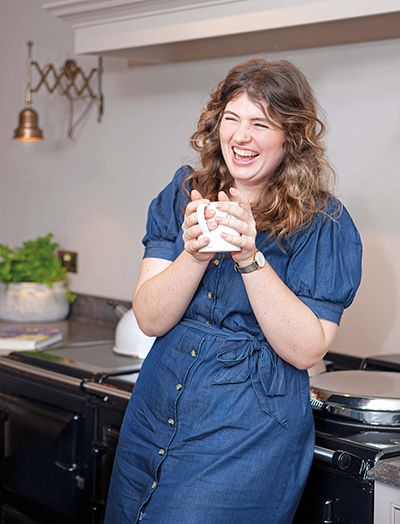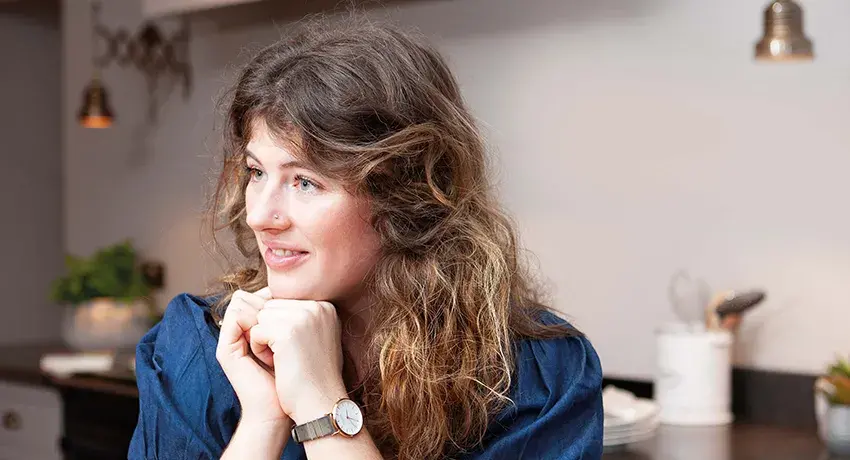Midnight Chicken (& other recipes worth living for) by Ella Risbridger is the second cookbook I’ve taken to bed and read cover to cover before it even made its way into my kitchen. The first was Nigella Lawson’s How to Eat, from which I learned to cook.
 The lesson Ella’s book offers – alongside some really great recipes – is that life is messy and sad and joyous and wonderful and, in the end, all we can do is keep going. And if we can keep going with lovely things to eat then all the better. Part cookbook, part memoir, it’s an extraordinary read which begins five years ago, when Ella had just turned 21.
The lesson Ella’s book offers – alongside some really great recipes – is that life is messy and sad and joyous and wonderful and, in the end, all we can do is keep going. And if we can keep going with lovely things to eat then all the better. Part cookbook, part memoir, it’s an extraordinary read which begins five years ago, when Ella had just turned 21.
She was living what seemed an enviable life: at university on a course she loved, sharing a flat with the man she hoped to one day marry and with the sort of friendship group that truly gets you.
From the outside, all was great and yet, as she says early on in the book, she felt “a storm was coming”.
That storm was a crippling anxiety disorder that led Ella to “step into the path of a number 25 bus, destination Oxford Circus”. She was taken to hospital and, while waiting for the duty psychiatrist, she began thinking about baking a pie.
Her book doesn’t begin with a pie. It starts with a chicken, one that Ella stared at while she was lying on the floor in her flat wondering if she would ever get up.
It isn’t, though, a sad book. Instead, Ella describes it as a hopeful story of how she did get up from that floor and – spoiler alert – cooked the chicken.
It’s also a story of her life with her boyfriend, the writer John Underwood, whom she refers to by his nickname, the Tall Man. He taught her to cook, set up her blog, Eating with My Fingers, and took care of her when her anxiety was at its worst. In the acknowledgements section, she cautions that there is a brutal twist halfway down the page and she goes on to write in a small, quiet voice that John died just after she finished the last draft of the book. He had chronicled his life with cancer and, between them, he and Ella raised more than £100,000 for the Anthony Nolan Trust.
I meet Ella, who lives in London with a flatmate, on a cold, winter’s day and she is exactly as I imagined. She is fiercely clever and vulnerable, funny and thoughtful. She is surprised at the amount of attention her book is getting.
“It’s overwhelming, mostly,” she says, “but I’m really pleased it’s out there and that it is resonating with so many people. The i Newspaper said this was the rarest of things, a cookbook where all the recipes work and that was my favourite thing. I’m always thrilled when people like my writing, but I’m more pleased when people say these recipes all do exactly what they say they’re going to do. Because I’m not professionally trained, I have a bit of imposter syndrome going on. I’ve just written a lot about cooking and tried really hard. There’s always that worry that surely they’re going to find me out, that someone is going to say ‘she’s not a proper cook at all’.”
If I am sure of anything, it is that this isn’t going to happen. To steal a phrase from Marie Kondo, the recipes Ella has put together spark joy and taste delicious and each comes with a story written so beautifully. It is one of those books – rather like How to Eat – that I think will become a classic.
No kitchen will be complete without a slightly battered, sticky copy with the odd note scribbled here and there. The Times describes Midnight Chicken as the first recipe book that should be made into a film and I couldn’t agree more. Ella’s story telling has a filmic quality. It’s apparent when she describes her childhood, growing up in Northamptonshire, where she tells me, “the AGA cookbook was a staple of my early recipe reading”.
There was an AGA in the kitchen and she makes references to it throughout the book. ‘Unless you have lived in a house with an AGA,’ she writes, ‘you cannot possibly understand what is so good about them. I had five blankets on my bed, and three electric heaters by it, and frost on the inside of my windows – and then the AGA, mighty, purring and Prussian blue, came into our lives like divine intervention.
'There is nothing in this whole wide world as good and delicious and wholesome as AGA toast, and I miss it every day. We kept a sofa in the kitchen and I viewed any attempt to get me off this sofa as a personal attack: I loved it there. It had soaked up so much dripped butter, and absorbed into the cushions so many toast crumbs, that it smelled of breakfast, and even now, when I think of somewhere I feel safe, I think of the kitchen sofa at Dairy Farm.’
 “I remember most of my early childhood getting dressed in bed,” she laughs as we sit chatting in front of another AGA. “Trying to wriggle into school tights under all these blankets. Then we got an AGA and things were warm.”
“I remember most of my early childhood getting dressed in bed,” she laughs as we sit chatting in front of another AGA. “Trying to wriggle into school tights under all these blankets. Then we got an AGA and things were warm.”
At just 26, Ella has a rare talent for capturing the small moments that many wouldn’t notice.
“I joke with my friends that I’m an archivist, taking notes on everything everyone is saying or doing,” she says.
She describes Midnight Chicken as a cookbook “with a memoir-ish edge” and says “my twin concerns were that the recipes should work and that I was fair to everyone else in the story”.
The final chapter of Midnight Chicken opens with Ella saying that while it may have looked like a cookbook it is really a manifesto of moments worth living for. I implore anyone who loves good food and lyrical writing to go out and get this very special book.










